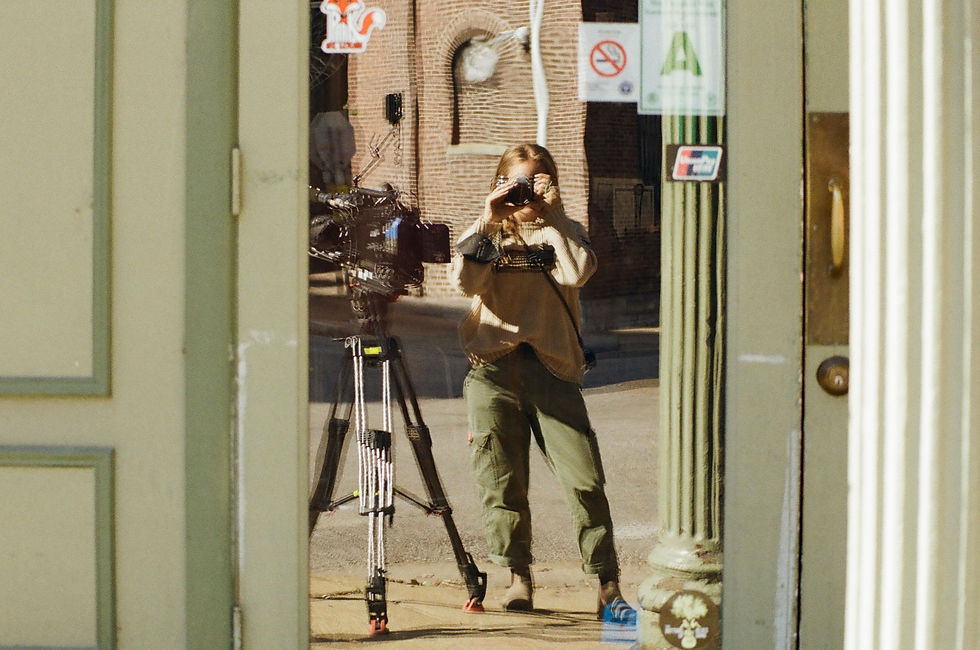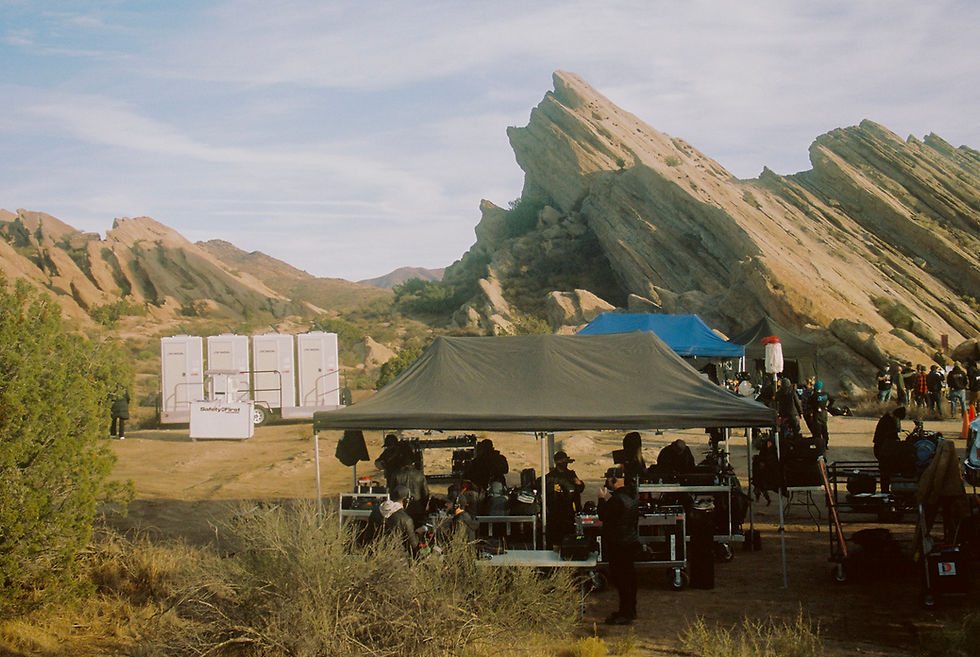It's Dead Out There: When the Entertainment Industry Comes to a Halt
- kaitcald
- Mar 24, 2023
- 7 min read

In February 2020, the entertainment industry was on an upswing. Many of us had been working consistently until December of 2019, had already worked some days in January — an anomaly — and had jobs lined up through the summer. When March — and the pandemic — came around, the industry came to an almost complete standstill. For many of us, it was the first time that we experienced a period of zero work — some jobs still continued filming — while other industry folks hadn’t seen a slowdown like this since 2008, during the last recession.
I started working freelance in the entertainment industry in 2014. I had never been a corporate junkie — hadn’t really had a 9-to-5 office job yet — so it wasn’t a huge culture shock for me. I was in my early twenties when I started as a production assistant on “The Kardashians” and fresh out of college so the wild, chaotic nature of everything was really quite thrilling. Still, it was somewhat strange. The lifestyle is fast, loose and rough at times: not knowing when you start work the next day until the night before, working twelve hours each day as a standard, being told when you can have lunch — which is usually only thirty minutes long and six hours into your work day. There are multiple locations, and a longer-term job is typically five to six days a week and sometimes more than four weeks long.

As I’ve matured into the industry, I can relate to the difficulty of maintaining the stamina for the ebb and flow of it all. In a usual calendar year — not counting the pandemic or what we’re experiencing currently — we have “normal” busy and slow periods. Slow periods are typically mid-December to the end of February or beginning of march and then July through September. While it’s not unlikely that you could find a job during those time periods, it is considered normal — part of the process, nothing to be alarmed about — that you might have less work during these months. For most of us, that means scaling back spending, jumping on unemployment, and dipping into our “work is slow” savings account that we have for these months specifically — and separate from our normal savings account that in theory goes toward a future life (I know we should, but does anyone actually have one of those?).
The start of 2023 — even the last six months — has been extraodinarily slow for the entertainment industry. In the last three years, there has been a lot of change. The pandemic slowed us down slightly, but then we ramped back up quickly and swiftly, with production companies and networks putting out more content than ever before. In 2019, there were 532 scripted series alone. That number dipped slightly in 2020 to 496, but then jumped back up to 559 in 2021 and now 599 in 2022 — the highest number of original scripted series yet.
In 2021, amidst new pandemic protocols and an effort for networks to catch up after a period of production delay, workers were growing increasingly frustrated with working conditions. New Instagram accounts, like the one run by lighting technician Ben Gottlieb called IATSE Stories, started popping up to show the darker side of what it’s like to work in the entertainment industry. Stories were being shared by various crew members — numbers into the thousands — calling out issues such as long hours on set leading to car accidents, unsafe environments, exhaustion, urinary tract infections, stress-related heart problems, and more. IATSE, The International Alliance of Theatrical Stage Employees, is the union that represents over 40,000 Hollywood workers. At the time, IATSE was attempting to secure a new contract — a three-year basic agreement — for behind-the-scenes entertainment workers with the AMPTP (Alliance of Motion Picture and Television Producers). The old contract, which expired in July of 2021, was extended through September while negotiations continued. With a strike looming — one that would have broken the industry — IATSE, or those that represent us, and the AMPTP eventually came to an agreement. Though many members’ important points were left out of the contract, the agreement allowed the industry to avoid a potentially difficult and lengthy period without work.
In 2022, AT&T merged WarnerMedia (includes HBO, TNT, CNN, and Warner Bros.) and Discovery to create a network that could compete with Disney and Netflix. The team managing the new company — led by CEO David Zaslav — hoped to create at least $3 billion in expected cost synergies — the savings in operating costs expected after the merger of companies — by axing most of HBO Max’s non-scripted division and TBS/TNT’s scripted teams, as well as pulling back on CNN’s originals. In this crusade against their own content, there has been a dismantling of popular, multi-season shows, furthering the issue of an oversaturated pool of crew members. “FBOY Island”, “Baketopia”, “Full Bloom”, and “Legendary” all staffed large crews of entertainment workers — each in the hundreds — and are just a few of the non-scripted shows that were scrapped during the merger. Many scripted series were cancelled as well, with employees losing out on shows like “Westworld”, “The Time Traveler’s Wife”, and “Minx”, just to name a few. Meanwhile, David Zaslav and other top executives received bonuses for their ability to free up cash and reduce debt, calling 2022 “a year of restructuring” with plans for 2023 to be “a year of building”. It certainly feels like a rebuilding period, at least for those below the line.

With signs pointing to an economic slowdown — and a potential writer’s strike — it’s safe to say that we might not be through the worst of it. Companies are shifting and adjusting to figure out how to make their dollar count at the top, and we will likely see the effects of this throughout the rest of the year. It’s always a good idea to be thinking about how you can hustle your talents elsewhere, if that’s something you’re into. Some industry friends have other jobs, like real estate or other freelance work that is supplemental. Others find that the hustle isn’t for them, deciding instead to search for more secure and stable work — and they’re not alone. In 2022, more than 50 million workers quit their jobs in what’s known as The Great Resignation to pursue better work. If a career change isn’t something you’re interested in, there are still a few other ways to survive during these slower months. If you don’t have a savings account, this is your reminder to make that a priority when things pick back up and you’re able to get on top of your finances — We Bravely Go has great tips on how to do that while on a budget.
Regarding the hustle, we are all in this shit-storm together. I know it can feel burdensome to reach out to your contacts for work, especially when it seems like we’re all out of work. Technically, we are all up against each other for jobs. It can appear very cutthroat, but keep in mind, some of the best worker movements happened because employees — even those in freelance — stuck together. In the Bay Area and also in New York, rates are much higher because everyone decides on a rate and refuses to take less. Send out those texts and emails, grab those coffees, and post about needing work on your social platforms — and do it without guilt or shame.
This industry needs an overhaul, and if there’s one thing their job slashing can teach us, it’s that they think they don’t need us. We are the below-the-line, baddest folks around, working more than sixty hours per week at times (if we’re lucky, right?!) to make content that is seen — and adored — around the world.
It can be frustrating to be an unemployed freelancer while studios like Fox Studio Lot and Radford Studio Center are planning billion-dollar overhauls, or watching top executives bring home multi-billion-dollar bonuses, all while cutting content and jobs for below-the-line employees. It’s important to remember my number one rule: you are the only person that is keeping you in mind, the only person that always has your professional back, and the only person that can do what you need to do to make your paper. So do what you have to do to survive, but also try to enjoy this break in your regular programming. We are usually always busy, always booked, with no time left for our families or our friends — or ourselves. Maybe for the first time, you can do something just for you — take up a hobby or do something in nature — while you wait for things to pick back up. And they will — they always do. So try to keep riding the wave, and remember — we’re all in this together.

If you find yourself falling onto really hard times, you have options. The Entertainment Community Fund — formerly The Actors Fund — offers many services and programs, including emergency financial assistance, to industry workers. If you’re not currently on your state’s unemployment, this is a great place to start. California residents can attest to the difficulty that is filing an unemployment claim, but you pay into it, and it is beyond worth it. There are great job pages on Facebook for industry workers, like this one or this one. If you’re an industry person and you feel like you have nowhere to turn, please message me. I will do my best to lead you in the right direction of assistance or information.
Industry Terms Explained:
Gig: A freelancer term for job. Sometimes we have more than one in one week gig in one week.
Production assistants (PAs) provide support with general tasks on a film, television, commercial or digital media production.
Below-the-line employees: a reference to a production’s budget and the top sheet, which includes the crew list, with a line separates the two groups. Above-the-line (ATL) positions are responsible for the creative development, production, and direction of a film or TV show. Below-the-line (BTL) refers to technical crew roles, or workers who do not provide input, guidance, creative development, or leadership on the project. These workers are not considered essential and can be replaced at any time. They are also not at a fixed or salary rate, but instead are paid by hour.

Comments